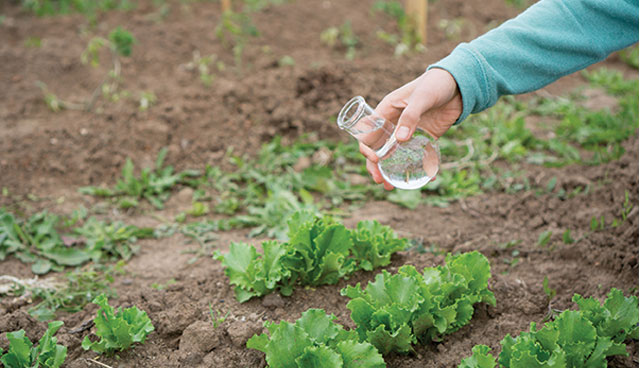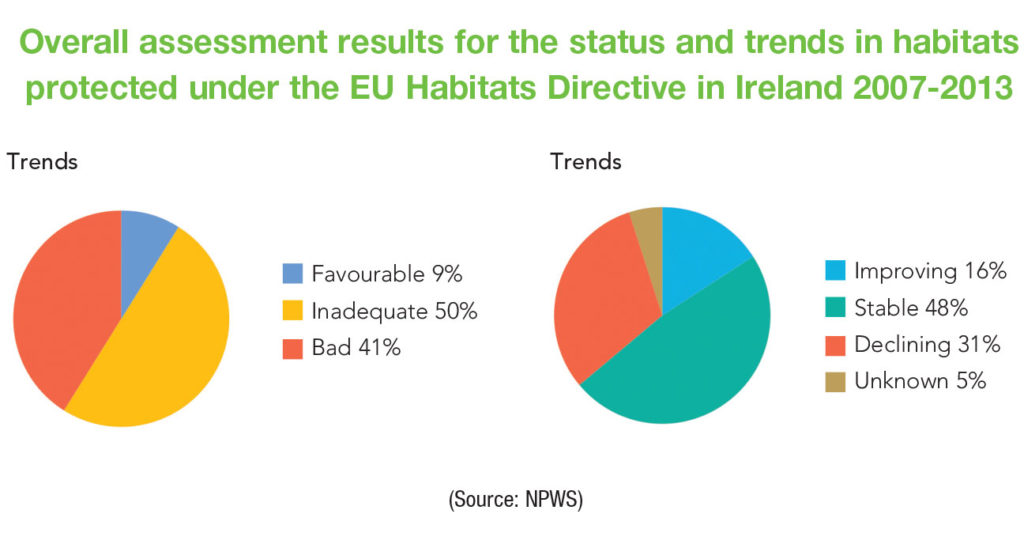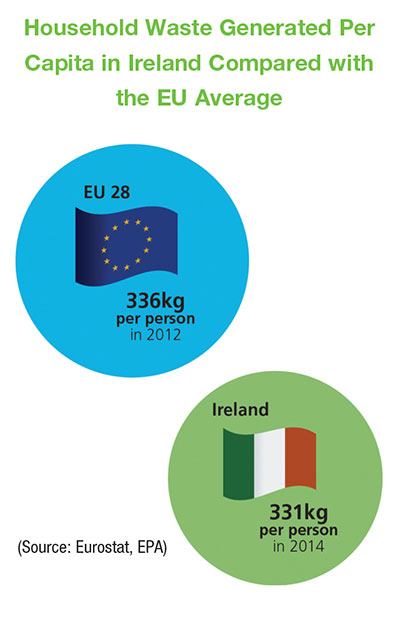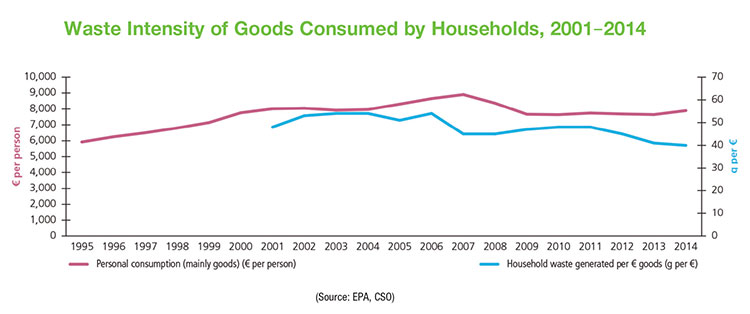State of the Environment


Following the release of the sixth State of the Environment Report, a comprehensive overview of the state of our environment and the challenges facing attempts at improvement, eolas examines the key findings of 2016.
Environment and health and wellbeing
The state of our environment can have both a positive and negative impact on our health. While Ireland presents a clean, safe environment to live in, there are still challenges around protection. The EPA reports that many local problems are being masked by national level assessment and points to the need for a greater level of vigilance towards climate change induced health risks, antimicrobial resistance and new chemicals/substances that can impact on the health and wellbeing of people in individual communities and on the local environment.
While Ireland’s air quality is above the European average, traffic congestion remains a key pressure on air quality, particularly in larger towns and cities. Locally, towns with a high dependence on coal, turf and or wood for home heating are also being impacted. In Ireland the premature deaths attributable to air pollution are estimated at 1,200 people annually. The Clean Air Strategy for Ireland, being led by the Department of Communications, Climate Action and Environment, presents an opportunity to address some of these issues. The report suggests adopting new stringent World Health Organisation guidelines into Irish legislation via the strategy.
Although limited to small numbers, the report highlights radon – the naturally occurring radioactive gas – as being present in some Irish homes and being responsible for illness. It calls for continued resourcing of the National Radon Plan to tackle the problem which it describes as “fixable” once identified through improved ventilation or damp-proof membrane installation.

Major investments are needed in both the public and group water sectors where there remains an “unacceptable” level of long-term boil water notices and on the EPA’s Remedial Action List. The report showed that while 70 per cent of drinking water supplies are seen as good, 20 per cent are slightly polluted and 10 per cent are moderately polluted. One of the largest concerns around water pollution is the E.coli risk associated with Ireland’s 180,000 existing private wells. Another is high levels of antibiotics flushed into the water supply, adding to a global problem of antimicrobial resistance. The recommendation is a multi-barrier approach which involves both blocking pollution at source and effective treatment and operation.
“Overall, there are many positives in the report and people can take heart from those. Relative to our European neighbours, our water quality is broadly good. So is our air quality. But when you get into the detail, you see that at local level, there are many worrying signals warning us that we are in danger and we need to act with a much greater sense of urgency.”
Director General, Environmental Protection Agency (EPA), Laura Burke

Nuisance, litter and waste-related issues made up a significant portion of 60,000 annual complaints to the local authorities and EPA. After poor air quality, noise nuisance was found to be the second-largest environmental source of human health morbidity and mortality in Europe in 2014. The report noted a significant number of complaints about odours emanating from industrial operations and while the responsibility largely rests with respective operators, policymakers and regulators also have a key role in protecting citizens.
Climate change
The impact of climate change in Ireland is most obvious in changing sea levels, which have risen by over 6cm since 1993. National policy has aimed for aggregate reduction in CO2 emissions of 80 per cent (from 1990 levels) by 2050 across the electricity generation, built environment and transport sectors. While a carbon neutrality approach to land use is targeted to ensure it does not compromise sustainable food production, the report states that Ireland’s acceptance of the Paris Agreement would require a greater sense of “urgency” around reducing dependency on fossil fuels.
Despite a trend of falling greenhouse gas (GHG) emissions across Europe, Ireland has increased its emissions in the Emissions Trading Sector (ETS), while wider sectors such as transport and agriculture are projected to increase heading toward 2020. Total projections of between 6-11 per cent total emissions for 2020 are below the 2005 level but still short of the 20 per cent target. This increasing trend does not appear conducive to meeting a national goal of transitioning to a carbon neutral society and economy.
A national climate change-related project is advised to switch from the use of fossil fuels to make up around 90 per cent of Ireland’s current energy profile and replace them with renewable energy sources. There is also a major requirement for a sustainable transport system which divorces from private car usage. The report recommends promotion of alternative fuels and electric vehicles, while urban areas require a more integrated network favouring transport modes which reduce air pollution and GHG emissions.
Implementation of legislation
While progress has been made in areas of waste and emissions, Ireland still needs to improve EU compliance in areas such as drinking water, urban waste water treatment, river basin district plans and Special Areas of Conservation. The report recommends that environmental enforcement bodies continue to target environmental risks and non-compliances to promote positive behaviour, while methods by which the public can report issues must remain up to date to make feedback easier and instant.
The report recommends building and implementing a “national land cover, land use and habitat mapping programme” for assessing the variety of land and its impact on the environment. It points to the challenge of building publicly appealing urban environments, which also incorporate climate-proofing. Things such as flood prevention should attempt to minimise the impact on green areas and wild spaces, while sustainable growth must not add to the existing environmental pressures such as loss of wetlands or delivery of drinking water.

Restore and protect water quality
Ireland is a “long way” from meeting the full requirements of the Water Framework Directive. Figures gathered by the report show no improvement in water quality over the first river basin cycle between 2009-2015 and that the 13.6 per cent improvement target for surface waters was not met. Around 50 per cent of Ireland’s rivers, lakes and estuaries require improvements, with agriculture (33 per cent) and municipal sources (34 per cent) being suspected as the main causes of pollution. Despite water quality in Ireland comparing favourably with other member states in the EU, there are now only 21 sites described as ‘pristine’ compared to over 500 in the late 1980’s. While Ireland’s worst rivers have improved, it has lost its best.
Identified as a principal pressure on water quality, the report recommends continued investment in urban waste water to provide, upgrade and manage sewer networks and treatment facilities. While implementing a new risk-based approach to managing water catchments has also been identified to restore and protect water quality.
In terms of Ireland’s marine environment the report states that while remaining largely unpolluted, increased pressure is being applied by both internal and external sources. Only 36 per cent of Ireland’s fish catches are considered sustainably fished and overfished stocks have declined to 26 per cent. As well as 46 of the 65 urban areas identified as having inadequate treatment discharging to estuarine or coastal locations in 2015, marine litter remains a key challenge and requires a comprehensive targeted waste policy.
Sustainable economic activities
Becoming resource efficient and sustainable in the current global climate is crucial to evolving Ireland’s economy. The report suggests that The National Waste Prevention Programme, which targets areas such as waste consigned to landfill and lowering of household waste per capita, needs significant resourcing at local level to combat recent CSO data, which highlighted that in 2016 around 500,000 national households do not implement waste prevention and a further 51,000 do not participate in legal waste management practices.
Moving Ireland’s material flow from a linear to a circular one, whereby products at the end of its life are captured for reuse, would be beneficial to the green economy and would aid the recommendation of doing better to ensure economic sustainability and competitive prosperity.
Ireland’s landfill capacity is at a “critical state” with less than one year’s capacity. Over dependence on the export market for treatment of recyclable waste means that the country is vulnerable to market changes such as currency fluctuations or EU policy. One of these EU policies requiring urgent attention is the phasing out of environmentally harmful subsidies at national level. In Ireland this requires adapting existing financial support. The report also points to a need to measure and benchmark the environmental credentials of agriculture and aquaculture in order to weigh up the planned expansion of agricultural output under Food Wise 2025 against degradation of the natural environment.
Nature and wild places
Habitat and biodiversity loss remain a risk in Ireland. Of the species and habitats considered threatened across Europe, 52 per cent of the species are considered favourable status in Ireland but just 9 per cent of habitats have the same status.
Community engagement
Community-led solutions offer new ways to approach environmental challenges in the future and a key priority at national level must be to ensure that successful projects are multiplied throughout the country. Similarities between the EPA report and the European Environment Agency (EEA) State of the Environment publication points to a correlation between Ireland’s environmental issues and those across Europe. Ireland’s report points out that as the economy begins to grow again, growth must be focused on sustainability and reduction of emissions.
The report concludes: “Ireland’s economy and economic policy are clearly making positive moves in relation to planning and have achieved some limited success in decarbonisation and resource efficiency; however, there is still considerable scope for improvement.”





